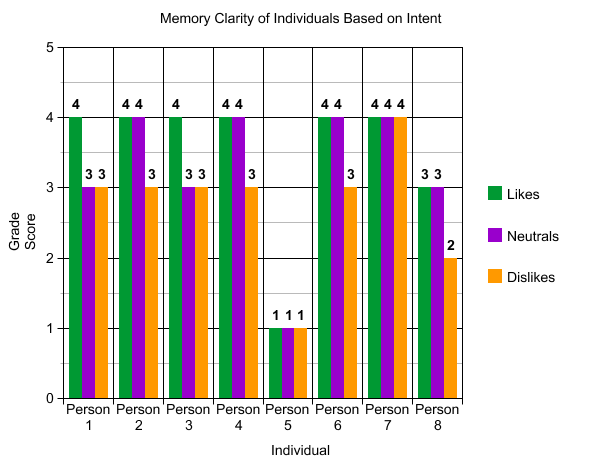Human Memory: How Intents, Consequences and Conditions Affect Recollection
Grade 9
Presentation
No video provided
Hypothesis
If the intent of a statement is to the individual's liking, the clarity of memory and speed of recollection will be clearer and faster because the individual will be more inclined to engage in something they enjoy, rather than something they do not, as different neuron connections will react to stimulus (the sound of the words, the topic and intent) and reconsolidate the connection changing it in some way by weakening it, strengthening it, or it having more meaning), either giving the individual a higher likelihood to remember or forget the statement.
Research
Human memory is held within a group of neurons, a cell assembly. Those cell assemblies fire and react to stimulus. That stimulus could be the face of your mother, a taste of chocolate, even. When those neurons fire together, they become more interconnected. This builds up a strength.
Memories are usually short-term, unless otherwise strengthened. For example, if you hear a person’s name, you are not always going to remember it, but if there are numerous interactions with that person, or you repeat their name, it becomes long term, a process called memory consolidation.
There are different processes in memory consolidation. One comprises the individual nerves modifying themselves, allowing them to communicate differently with their neighbouring nerves. This serves to strengthen bonds between the nerves and solidify the memory.
Not all memories begin as a short-term memory.
When a memory is recalled, or remembered, the act of remembering causes the cortex, the medial temporal lobe and an area that controls our senses begin communicating.
Memories can be altered, and in the act of remembering, some memories are reconsolidated. This means that the memories are malleable, and can be strengthened, changed or potentially even weakened. Some memories are more susceptible to change, such as flashbulb memories, which are memories that directly correspond to where and what people were doing on a momentous occasion, often staggeringly bad news or abrupt, spontaneous occurrences.
Memories can be altered and influenced by the environment around the person when they try to recollect, because of reconsolidation, the memory is altered by some of the outside stimuli.
There are different kinds of memories, such as declarative memory, which are memories that you experience consciously. They can be facts, like the Eiffel Tower is in Paris, or a past event that you experienced, such as a holiday.
Nondeclarative memory is unconsciously built. These are procedural memories, which your body does repeatedly. For example, playing an instrument is a procedural memory. They can shape the way your body reacts to certain things, such as flinching at the sight of something that you fear.
Declarative memories are easier to form than nondeclarative memories, but you are more likely to retain nondeclarative memories.
Variables
Manipulated Variable:
Intent of the statement being told/relayed to the individual/subject being tested.
Responding Variable:
Recollection speed and memory clarity of the individual within a specific time interval (how fast they can recall the statement, and to what amount of the statement they can remember within a certain time limit).
Controlled Variables:
1) The number of statements each participant is asked at a given time.
The number of statements should remain the same, because the number of statements can affect a person's memory of the statements given.
2) The statements given at a time.
All participants need to be asked the same (or similar statements depending on the intent), to have the same effect on a person’s memory.
3) The time given in intervals to different interviews, and the time given to remember the statements given at the last.
All participants need to be given the same amount of time or filler task (eg: number of reps for an exercise) between interviews, and be given the same time to remember the statements at the interview (eg: 30 minutes between interviews, and the person is given 2 minutes to repeat and remember the statements).
Procedure
Prep:
- Create rubric used to ‘grade’ the recollection speed and clarity of the tested individual
- Create the pre-interview survey
- Purchase materials/find materials needed for the experiment
- Create Spreadsheets for data storage
Pre-Interview:
- Before the experimental interview, I ask the subject to fill out a form/survey and tell me about themselves (eg: likes, dislikes, neutrals)
- Before the experimental interview, use the information from the survey to come up with basic statements of the different intents (similar to the other statements)(using generalized data from the student responses (eg: boys have a majority that say “I like video games”) )
- If a person has different interests from other people, create more personalized questions for said individual(s)
- Print out rubrics created to ‘grade’ the recollection speed and clarity of the individual
- Set up times and dates for the interviews
- Set up exercises and topics for filler activities
Interview:
- Tell them three pre-prepared statements at a time (one like, one dislike and one neutral)
- Give them a set number of exercises with reps or a topic to write on (with minimum paragraph numbers)(filler activity)
- Ask them to recite the statements given to them prior to the filler (2 minutes per statement)
- Use a stopwatch or phone to time the responses/recitement of the statement
- Use a notebook to write down the words the subject/individual said when reciting, or use a phone to record their voice and use that afterwards
- Record the time it took for them to recite the statements on the rubric and grade it
- Record the clarity (how much they remember) of the statements using rubrics and comparisons of the statement they gave/recalled and the original statement and grade it

Observations
Observations:
- For the most part, the individuals tested could remember what they were told
- Most people had confidence when speaking, and believed their results were conclusive and factual
- There were two outliers, Person 5 and Person 7
- There were more 4’s in the likes (memory clarity)
- There were more 3’s in the neutrals and dislikes (memory clarity)
- There were more 4’s in the likes (recollection speed)
- There were more 4’s and 3’s in the neutrals
- There are more 3’s and 2’s in the dislikes
- Note thtat testing is still ongoing-more results will be presented at the Olympic Oval


Analysis
Graph/Data Analysis:
- Intent of statement seems to influence memory
- Likes over neutrals
- Neutrals over dislikes
- Speed for testing varied
Other Considerations:
- Some people speak more quickly than others
- Some things may have seemed vague
- More explanations of the experiment may have been needed
- Depending on people is always difficult
- Note thtat testing is still ongoing-more results will be presented at the Olympic Oval
Please see this link https://www.veed.io/view/fed509ff-3892-4d28-99a5-1e1e8d1924f2?panel=share (link to presentation video due to video not uploading)
Conclusion
- Results supported hypothesis
- People remembered things they were more inclined to engage in
- The results were not too varied
- The test succeeded with most individuals
- Note thtat testing is still ongoing-more results will be presented at the Olympic Oval
Please see this link https://www.veed.io/view/fed509ff-3892-4d28-99a5-1e1e8d1924f2?panel=share (link to presentation video due to video not uploading)
Application
This could apply in almost any circumstance involving memory, at any point in time. For example, if someone know what an individual liked/disliked etc., they would be able to use this information and their knowledge of the individuals likes/dislikes etc., they could make remembering important tasks, dates and events easier.
Sources Of Error
Errors:
- Leaving early, or not following up
- People not showing up for their scheduled times/dates
- Over complication and lack of foresight when preparing the experiment
Citations
- Research Information 1
Greshko, Micheal. Human memory: How we make, remember and forget memories. https://www.nationalgeographic.com/science/article/human-memory March 4, 2019
- Research Information 2
Miller, Greg. How Our Brains Make Memories. https://www.smithsonianmag.com/science-nature/how-our-brains-make-memories-14466850/ May, 2010
- Research Information 3
Unknown Last/First Name. Inside the Science of Memory
- Research Information 4
Taylor, Lee. Watkins, L. Samuel. Marshall, Hannah. Dascombe, J. Ben. Foster, Josh. The Impact of Different Environmental Conditions on Cognition: A Focused Review. The Impact of Different Environmental Conditions on Cognition: A Focused Review 2016 Jan 6
Acknowledgement
Thanks to Karen Davis, my first SMATH teacher at Louis Riel, for coordinating Science Fair and believing in me the whole way through. Thanks to Ben Wetsch, my current SMATH teacher at Louis Riel, who provided insight into not overcomplicating this project, and allowing me to stay in at lunch for testing. Thanks to Sara Sundtrom, my mother, for her encouragement and support. Thanks to Michael Lowenstein, my dad, for his help in shaping me into the scientific mind I am today.
Thanks to all of the participants (who will not be named), that gave me the information I needed for this project to be successful. Thanks to everyone who showed interest and asked me about my project, allowing me to think about it in different perspectives.
Thanks to everyone at CYSF who coordinates, judges and hosts this event. I couldn't be here without the motivation to participate in the event you make possible.

